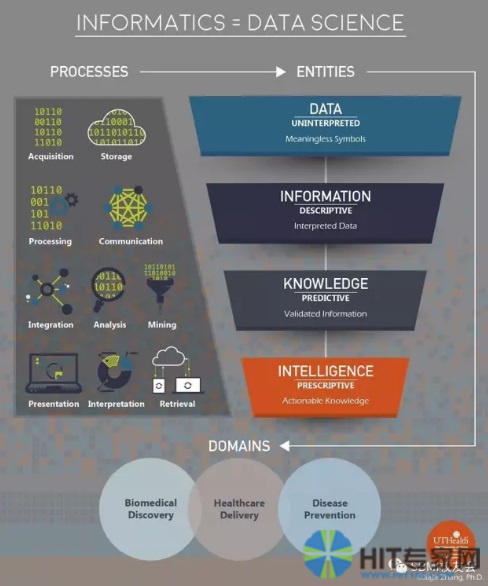来源:HIT专家网 作者:德州大学休斯顿健康科学中心生物医学信息学院院长、教授 张家杰
休斯顿生物医学信息学院(SBMI –School of Biomedical Informatics)是德克萨斯大学休斯顿健康科学中心(UTHealth)六个学院之一,是德克萨斯州唯一的生物医学信息学学位授予单位,是全美唯一一个学院级的、也是全美规模最大的生物医学信息学机构。SBMI的使命是教育和培养未来生物医学信息学和健康信息技术的科研和应用专业人才,进行信息学研究,改善医疗保健和推进生物医学发现,开发和使用先进的信息学工具来解决生物医药和保健领域的实际问题。SBMI的目标是作为一个服务德克萨斯州,领导全美,影响世界的信息领域的创新者。SBMI在过去几年(2013-2017年)一直在飞速增长,学生人数和教授人数四年都增加了三倍。
生物医学信息学是一个高度跨学科的领域,涉及临床科学和实践(医学、护理、牙科、药学、人口健康等),公共和社区健康,计算机科学与工程(包括人工智能和机器学习),数学和生物统计学,认知科学,社会和行为科学,医疗管理,健康IT政策和法律。生物医学信息学研究数据的采集、存储、通信、处理、集成、分析、挖掘、检索、解释和数据的呈现以及如何将数据(无意义符号)转换为信息(已解释的数据)到知识(验证过的信息)再到智能(可以实用的知识),并以此来解决生物医学发现、医疗保健和疾病预防等问题。
数据科学是一个近期伴随着大数据的大量涌现而出现在其他领域和行业的新名词,但实质上,数据科学就是信息学,生物医学和医疗卫生领域的数据科学就是已有很长历史的生物医学信息学。
生物医学信息学领域有许多工作机会,包括:电子病历实施和管理、信息管理、数据分析、远程医疗、基因组测试和诊断、精准和个性化医疗、移动健康和可穿戴健康、医疗质控、健康保险数据分析等很多方面。
SBMI教授的学术背景很广,代表了生物医学基础研究、医疗保健和疾病预防的信息学的理论和应用方面,他们将前沿科学研究的重点放在转换医学上,将实验室的信息学研究转换到病床边、社区中、和市场上。学生会发现学院这种以科研为基础,高度跨学科,并以团队精神为导向,嵌入研究项目的教学方式会极大的激发学习的积极性、挑战性,并为毕业后的职业发展奠定非常有竞争性的基础。
学院在德克萨斯医疗中心的独特环境中提供硕士、博士以及研究生证书教育,该医疗中心是世界上生物医药和医疗专业机构以及医疗知识和技能最集中的领域,也是世界上规模最大的医疗中心。这里有很多机会让学生参与信息学的实习和科研,因为这里有UTHealth临床和研究组织及其他50多个医疗机构。学生可与顶尖的、经验丰富的研究人员进行互动,积极开展研究工作和为各种生物医学信息学问题开发解决方案。
通过研究所和合作中心,如国家认知信息与卫生决策中心、墨西哥湾区卫生信息技术推广中心、墨西哥湾区定量生物医学科学联盟、计算生物医学中心、精准医疗健康中心、系统医学中心、临床和转化科学中心、分子医学研究所等,学生将会和最顶尖的研发及教育人员在科学和技术的前沿互动。我们的硕士生和研究生证书生将学习最先进的生物医学信息学和健康信息技术,并把它们应用于改善健康和优化医疗。博士生将与生物医学信息学领域的学术带头人合作,创造新的知识,推进学科,开辟新的领域,包括转化生物信息学、精准医疗和健康大数据分析。
我们学院的学生和教授来自很多不同的领域,包括各种医疗健康专业(医疗,护理,药学,公共卫生等)、生物医学基础科学、计算机科学和工程、数理统计、生物医学工程、医疗管理、认知科学、行为及社会科学。学校的教育和研究的“跨学科”性质使其独特而有价值,为突破性的发明创造提供了很好的条件。学校教授和学生参与了大量的医疗保健和生物医学的研究,并做出了很多突破性的贡献。这包括发明了新的用来采取、存储、整合、提取、显示、应用和评估医疗保健和生物医学数据、信息、知识和智能的方法。SBMI正在探索基因组学与临床医疗之间的关系,开发用于提高医疗保健质量和安全性的大数据分析,以及开发电子病历系统的未来功能和模块。我们的教授和学生正在通过自然语言处理和机器学习的算法来发现现有药物的新功能,对电子病历以及医学文献进行数据挖掘来监测和检测药物相互作用的潜在不良反应。在使用健康数据改善医疗管理的同时,SBMI学生和教授开发社区移动平台,向偏远地区提供医疗健康服务。在我们学院进行的研究有助于发现社会互动的新方法和工具,并促进疾病预防和公共卫生保健。人工智能和深度学习算法正在用于关联基因结构及临床特征,并用于检测帕金森病和精神疾病,用于成像诊断和寻找及发现计算生物标志物。SBMI另外还使用生物统计方法和统计学习算法来识别癌症和其他疾病的基因基础。SBMI在教学上也在不断创新,为学生设计和实施了基于能力的灵活方便的在线教育和学习环境。
如果这是你正在寻找的那种具有挑战和创新性的学习环境,那么请加入我们,成为领导明天医疗信息技术的开拓者之一。“预测未来的最好办法就是创造未来”(Alan Kay)。请大家一起来和我们创造医疗保健、疾病预防和生物医学研究的未来。
【作者简介】
张家杰教授:德州大学休斯顿健康科学中心生物医学信息学院院长、教授,Glassell 家族基金会Distinguished Chair,美国国家认知信息学和决策中心(National Center for CognitiveInformatics and Decision Making)主任,于2010年获得美国联邦政府1500万美元的“国家医疗信息化战略性高级研究项目”(SHARP项目)的支持。研究方向包括:生物医学信息学、认知科学、人机交互、离散认知、电子病历易用性及工作流程、医疗决策、健康大数据、信息可视化。
张家杰教授曾获John P. McGovern杰出教学奖、美国亚太传统文化协会布什总统奖, 并且是代表美国医学信息学领域杰出成就和荣誉的 “美国医学信息学院”(American College of MedicalInformatics)Fellow。他是中国科技大学少年班毕业,并于加州大学圣地亚哥分校获得世界上第一个认知科学博士。
【附英文原文】
Message from the Dean – Informatics and Data Science in Medicine
The School of Biomedical Informatics at Houston (SBMI), an academic component of The University of Texas Health Science Center at Houston (UTHealth) is the only academic program of biomedical informatics in the State of Texas and the only free-standing school of biomedical informatics in the nation. The mission of SBMI is to educate and train future scientists and professionals in biomedical informatics and health information technology, to conduct informatics research to improve healthcare and advance biomedical discovery, and to develop and use advanced informatics tools to solve practical problems in biomedicine and healthcare. SBMI is an informatics innovator serving Texas, leading the nation, and impacting the world. SBMI has been undergoing rapid growth over the past few years (2013-2017), tripling both student enrollment and faculty size.
Biomedical informatics is a highly interdisciplinary field with contributions from clinical science and practice (medicine, nursing, dentistry, pharmacy, population health, etc.), public and community health, computer science and engineering (including artificial intelligence and machine learning),mathematics and biostatistics, cognitive science, social and behavioral sciences, healthcare management, and health IT policy and law. Biomedical informatics studies the acquisition, storage, communication, processing, integration, analysis, mining, retrieval, interpretation, and presentation of data and how to transform data (meaningless symbols) to information(interpreted data) to knowledge (validated information) to intelligence (actionable knowledge)to solve problems in biomedical discovery, healthcare delivery, and disease prevention.
Data science is a new term that emerges in other fields and industries with the recent surge of big data, but in essence, data science is informatics and data science in biomedicine and healthcare is biomedical informatics, which has been around for a much longer time.
The biomedical informatics field has many job openings and continues to expand with careers ranging from electronic health record implementation and management, information governance, data analytics, telemedicine, genomic testing and diagnosis, precision and personalized medicine, mobile and connected health, healthcare quality analysis and reporting, health insurance data analysis, and more.
The varied and talented faculty represent expertise both in the theory and practice of informatics applied to biomedical discovery, and healthcare delivery, and disease prevention, and the pursuit of cutting edge research with a focus on translational informatics moving research from the lab to the bedside, to the community, and to the market. Students find the school’s performance-based, highly interdisciplinary, team-oriented education and research programs stimulating, challenging and career enhancing.
Master’s and doctoral degrees, along with certificate programs are offered in the unique environment of the Texas Medical Center, the most concentrated area of biomedical and healthcare expertise, knowledge and skills in the world. There are outstanding opportunities for students to be involved in informatics as it is applied to health care and biomedical research in the many UTHealth clinical and research components and the more than fifty other healthcare related entities in the surrounding Texas Medical Center. Students interact with highly qualified and experienced faculty active in research as they develop solutions for a wide array of biomedical informatics problems. Through research consortia and centers, such as the National Center for Cognitive Informatics and Decision-Making in Healthcare, Gulf Coast Regional Extension Center for Health IT, Gulf Coast Consortia for Quantitative Biomedical Sciences, Center for Computational Biomedicine, Center for Precision Health, Center for Systems Medicine, Center for Clinical and Translational Sciences and the Institute for Molecular Medicine for the Prevention of Human Diseases, students will interact with the best and brightest on the frontiers of human experience. Our certificate and master’s students will learn to apply the most advanced understanding of biomedical informatics and health information technology to improve biomedical discovery and the delivery of healthcare. Doctoral students will work with leading researchers in a broad array of biomedical informatics areas to create new knowledge, advance the discipline, and open up new areas such as translational bioinformatics, precision medicine, and big health data analytics for future generations.
Students and faculty in our programs come from numerous health professions (medicine, nursing, pharmacy, public health, etc.), basic sciences, biomedical sciences, computer science, engineering, biomedical engineering, healthcare management, cognitive science, and social sciences. The “transdisciplinary” nature of the School’s educational and research programs makes them unique and rewarding and results in breakthrough discoveries. School faculty and students are involved in making groundbreaking contributions to healthcare delivery and biomedical discovery. This includes inventing and evaluating new ways to capture, store, integrate, access, display, utilize, and evaluate healthcare and biomedical data, information, knowledge, and intelligence. SBMI is exploring the relationships between genomics and clinical care, developing big data analytics for healthcare quality and safety and pioneering futuristic functions and modules for electronic health records systems. Our faculty and students are discovering new functions for existing drugs while also monitoring and detecting potentially adverse events of drug interactions through natural language processing and data mining of electronic health records and medical literature with machine learning algorithms. While using health data to improve healthcare management, students and faculty in the SBMI community can develop mobile platforms to deliver health information to remote areas. The research performed at our school aids in the discovery of new methods and tools of social interaction to promote health prevention and public health. Artificial intelligence and deep learning algorithms are used to map genotypes and phenotypes and to detect computational biomarkers for Parkinson’s disease, psychiatric disorders, and imaging diagnosis. Biostatical methods and statistical learning are used to identify the genomic basis of cancer and other medicine conditions. SBMI is also innovative in the use of educational research and technology, revolutionizing how to design and implement competency-based online educational and learning environments for both biomedical scientists and healthcare professionals.
If this is the kind of challenge and learning environment you are looking for, then join us and become part of the informatics leaders of tomorrow. “The best way to predict the future is to invent it” (Alan Kay). Help us invent the future of healthcare delivery, disease prevention, and biomedical discovery.
Jiajie Zhang, PhD
SBMI Dean
【责任编辑:谭啸】
 HIT专家网
HIT专家网





评论前必须登录!
注册